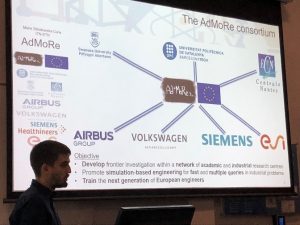Last week Guillem gave some details about the outreach talk that he and me gave at Swansea University (https://www.lacan.upc.edu/admoreWeb/2018/12/outreach-talk-at-swansea-university/). The main objective of this talk was to share our experience as PhD students and in as Marie Curie ESRs with undergraduate and master’s students. For this, after describing the AdMoRe project, and the different areas of research within it, we explained our particular project in a bit more detail. We described the challenges that we want to address and the two different approaches that we are working on, but without entering into deep mathematical details. Basically, we described the advantages of reduced order modelling techniques in a very simple manner, describing how they help to optimize the design workflow in an industrial environment and what are the difficulties to apply them. We also gave a brief overview of the main challenges that arise in the case of developing a full order accurate three dimensional tool and how both approaches complement each other. We finally showed some nice plots of interesting results that can be generated with these tools.
Then, we gave some indications on how to apply for internships positions with our industrial partner (Siemens Healthineers). We discussed the different types of positions (annual or summer placement), the requirements and the web page where the application can be made. We also talked about our personal experience and how we believe a placement in industry is a great opportunity to have a first impression of what kind of work you could do once you finish your studies. We also encouraged them to consider applying for a PhD and especially for the different Marie Sklodowska-Curie grants available (Innovative Training Networks, European Industrial Doctorates, European Joint Doctorates and Individual Fellowships), as we believe they are a great opportunity to get a great training and start developing a good professional network as well as offering the possibility to have a very enriching experience (travel, work with different companies and universities, attend international conferences…).
We then finished the talk and opened a discussion with the audience. We got several questions, some of them about the research itself but interestingly the majority where about how is the experience of doing a PhD, what are the requirements or how we applied for the position.
